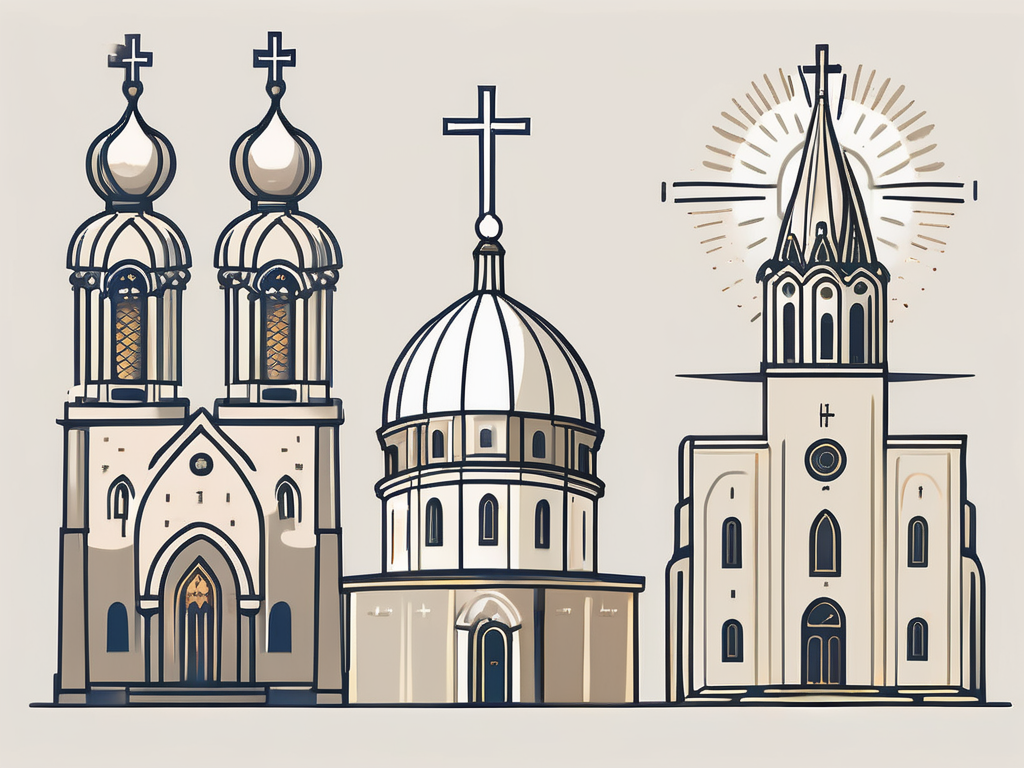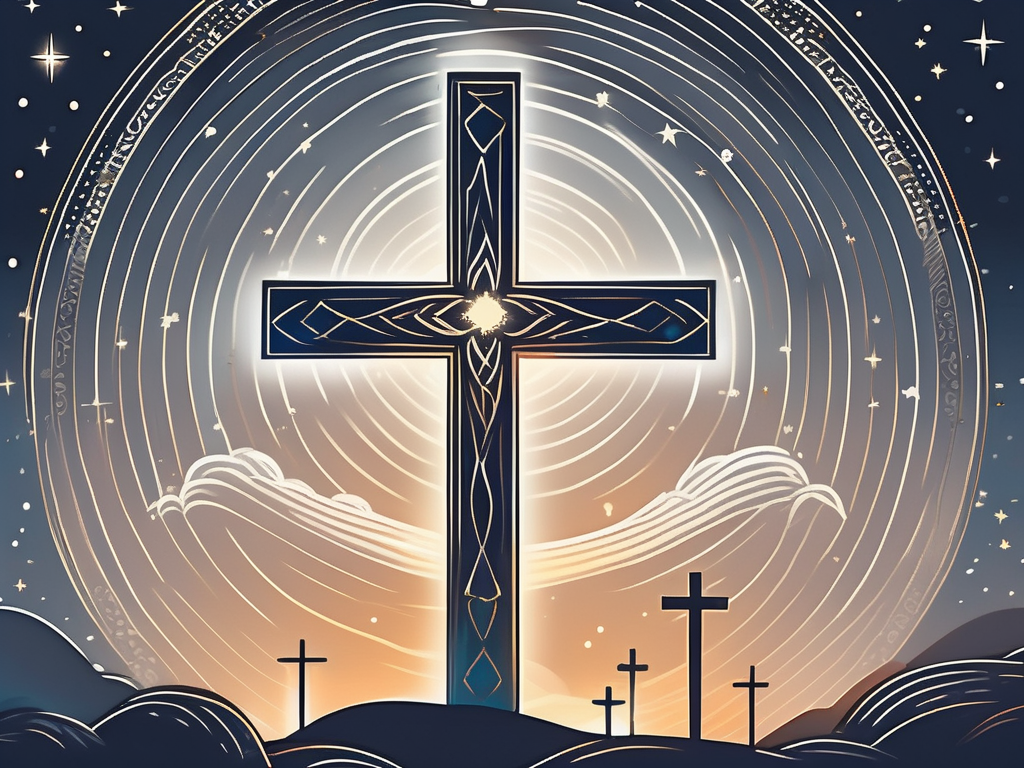Christianity is one of the largest religions in the world, with billions of followers across different continents. Its teachings and beliefs are central to the lives of many individuals, shaping their values, actions, and the way they view the world. In this comprehensive guide, we will explore the key tenets of Christianity and delve into its origins, core beliefs, denominations, and the role of sacraments.
Understanding Christianity: An Overview
Before we dive into the intricacies of Christianity, it is important to have a broad understanding of this faith. Christianity emerged over two thousand years ago and has its roots in the ancient land of Israel. It is based on the life and teachings of Jesus Christ, who is considered the central figure and the Son of God by Christians.
Christianity is a complex and diverse religion that encompasses a wide range of beliefs, practices, and traditions. It has evolved over the centuries, adapting to different cultures and contexts while maintaining its core principles.
The Origin and History of Christianity
The origins of Christianity can be traced back to the first century when Jesus began his ministry. Born in Bethlehem, Jesus grew up in Nazareth and started preaching about the Kingdom of God and the importance of love, compassion, and forgiveness.
His teachings and miracles attracted a dedicated group of followers, who were inspired by his message of hope and salvation. However, Jesus’ radical ideas and challenge to religious and political authorities led to his arrest, trial, and crucifixion.
After his death, Jesus’ followers, known as disciples, were devastated. But their grief turned into joy when they witnessed Jesus’ resurrection, his return from the dead. This event became the cornerstone of Christian faith and gave his disciples the courage to spread his message to the world.
Over time, Christianity grew and evolved, eventually becoming an influential force in the Roman Empire. Despite facing persecution and opposition, Christians remained steadfast in their beliefs and continued to spread the teachings of Jesus.
With the conversion of Emperor Constantine in the 4th century, Christianity gained official recognition and support from the Roman government. This marked a significant turning point in the history of Christianity, as it transitioned from a persecuted minority to a dominant religious and political force.
As Christianity spread throughout Europe, it encountered different cultures and traditions, leading to the development of various branches and denominations. Today, Christianity is the largest religion in the world, with over two billion followers.
The Significance of the Holy Bible
The Holy Bible is the sacred text of Christianity, consisting of two main sections: the Old Testament and the New Testament. The Old Testament contains the religious writings of ancient Israel, including the books of Genesis, Exodus, Psalms, and Proverbs, among others.
The New Testament focuses on the life, teachings, death, and resurrection of Jesus Christ, as well as the early Christian community. It includes the four Gospels (Matthew, Mark, Luke, and John), the Acts of the Apostles, the Epistles (letters) of Paul and other apostles, and the Book of Revelation.
For Christians, the Bible is not just a historical document but also a source of guidance and spiritual nourishment. It is seen as the word of God, providing moral principles and teachings to live by. The Bible is often read and studied individually, in small groups, or during worship services.
Throughout history, the Bible has been translated into numerous languages, making it accessible to people from different cultures and backgrounds. Its teachings have inspired countless individuals, shaping their beliefs, values, and actions.
Christianity places great emphasis on the importance of faith, love, and compassion. It encourages believers to follow the example of Jesus Christ, who taught his followers to love one another, care for the poor and marginalized, and seek justice and peace.
As we delve deeper into the intricacies of Christianity, we will explore its core beliefs, sacraments, rituals, and the diverse expressions of this faith across different cultures and denominations.
The Core Beliefs of Christianity
At the heart of Christianity are several core beliefs that shape the worldview of believers. These beliefs form the foundation of the faith and guide Christians in their understanding of God, salvation, and the purpose of life.
Christianity is a rich and diverse religion, with a multitude of beliefs and practices. While there are many variations within the faith, there are certain core beliefs that are shared by the majority of Christians worldwide. These beliefs provide a framework for understanding the nature of God, the role of Jesus Christ, and the path to salvation.
The Concept of Trinity
One of the distinctive features of Christianity is the belief in the Trinity. Christians believe in one God who exists in three persons: the Father, the Son (Jesus Christ), and the Holy Spirit. This triune nature of God is a mystery that is central to Christian theology.
The concept of the Trinity can be difficult to grasp, as it goes beyond human comprehension. It is a divine mystery that reflects the complexity and depth of God’s nature. The Father, the Son, and the Holy Spirit are distinct persons, yet they are all fully God and share the same divine essence.
Each person of the Trinity has a distinct role and function, yet they are all connected and united in their divine essence. The Father is the creator and sustainer of the universe, the Son is the redeemer and savior of humanity, and the Holy Spirit is the guide and comforter. This belief reflects the complex relationship between God and humanity, offering a unique perspective on the nature of God’s love and salvation.
The Life and Teachings of Jesus Christ
Jesus Christ is the central figure of Christianity. He is believed to be the Son of God, sent to Earth to reveal God’s love and provide salvation for humanity. The life and teachings of Jesus, as recorded in the New Testament, serve as a guide for Christians in their spiritual journey.
Jesus preached about love, forgiveness, compassion, and the importance of living a righteous life. His teachings emphasized the value of every individual, regardless of their background or social status. He taught his followers to love their enemies, to turn the other cheek, and to care for the poor and marginalized.
Jesus’ life was marked by humility, selflessness, and a deep commitment to serving others. He performed miracles, healed the sick, and even sacrificed his own life on the cross to offer salvation to humanity. His teachings continue to inspire and challenge Christians to live lives of love, compassion, and service.
The Doctrine of Salvation
Salvation is a fundamental concept in Christianity. Christians believe that through faith in Jesus Christ, they can be forgiven of their sins and receive eternal life with God. This belief is based on the notion that Jesus’ death on the cross served as a sacrifice to atone for humanity’s sins.
Salvation is not earned through good works or personal efforts, but rather it is a gift of God’s grace. It is through faith in Jesus Christ that Christians are reconciled with God and receive the assurance of eternal life. This belief in salvation offers hope and reassurance to Christians, providing them with a sense of purpose and the motivation to live a life that reflects their gratitude for God’s love.
Christianity teaches that salvation is available to all who believe in Jesus Christ, regardless of their past mistakes or shortcomings. It is a message of hope and redemption, offering a fresh start and the promise of a transformed life. Christians are called to share this message of salvation with others, inviting them to experience the love and grace of God.
In conclusion, the core beliefs of Christianity shape the faith and worldview of believers. The concept of the Trinity, the life and teachings of Jesus Christ, and the doctrine of salvation are central to Christian theology. These beliefs provide Christians with a foundation for understanding the nature of God, the purpose of life, and the path to eternal salvation.
The Different Denominations of Christianity
Christianity encompasses a diverse range of denominations, each with its own distinct beliefs, practices, and traditions. While all denominations share core Christian beliefs, they also have variations that have developed over centuries.
Let’s delve deeper into the fascinating world of Christianity and explore the unique characteristics of some of its major denominations.
Roman Catholicism: Beliefs and Practices
Roman Catholicism is one of the oldest and largest Christian denominations. It is centered around the authority of the Pope and the Magisterium, which provides spiritual guidance and interprets the teachings of the Church.
Catholics have a rich sacramental life, believing in the real presence of Christ in the Eucharist and the power of the sacraments to convey divine grace. The seven sacraments, including baptism, confirmation, and marriage, hold significant importance in the Catholic faith.
Furthermore, Catholics honor the Virgin Mary and the saints, seeking their intercession and seeing them as models of holiness. The veneration of Mary, known as Marian devotion, is an integral part of Catholic spirituality.
Protestantism: Variations and Commonalities
Protestantism originated from the Reformation in the sixteenth century when reformers challenged certain practices and beliefs of the Catholic Church. Protestant denominations include Lutheranism, Calvinism, Anglicanism, and various others.
Protestants emphasize the authority of the Bible, salvation by faith alone, and the priesthood of all believers. They believe that individuals have direct access to God and do not require an intermediary, such as a priest, to communicate with Him.
Protestant worship services often prioritize congregational participation, with an emphasis on preaching and communal singing. The diversity within Protestantism is vast, with different denominations placing varying degrees of importance on liturgy, sacraments, and traditions.
Eastern Orthodoxy: Tradition and Theology
Eastern Orthodoxy is a branch of Christianity that developed in the Byzantine Empire. It places a strong emphasis on tradition, liturgy, and mystical experience.
Orthodox Christians believe in the importance of unity with God through prayer, fasting, and participation in the sacraments. The Divine Liturgy, a sacred and elaborate worship service, is central to Orthodox worship.
Another distinctive aspect of Eastern Orthodoxy is the veneration of icons, which are considered windows into the heavenly realm. Icons are not worshipped but are seen as aids to prayer and meditation, helping believers to connect with the divine.
Furthermore, the Eastern Orthodox Church has a hierarchical structure, with the Patriarch of Constantinople considered the “first among equals” among the various Orthodox bishops.
As we can see, Christianity is a rich tapestry of beliefs and practices, with each denomination offering its own unique perspective on the faith. The diversity within Christianity reflects the vastness of human spirituality and the different ways in which people connect with the divine.
The Role of Sacraments in Christianity
In Christianity, sacraments are seen as sacred rituals or acts that signify and grant God’s grace. They hold deep spiritual significance and are considered means of experiencing God’s presence and receiving His blessings.
Baptism: The Rite of Initiation
Baptism is the sacrament of initiation into the Christian faith. It involves the pouring or immersion in water, symbolizing the cleansing of sin and the entry into a new life in Christ. Baptism signifies spiritual rebirth and membership in the community of believers.
Through baptism, Christians are united with Christ and become part of the Church, the body of Christ on Earth. It is an essential sacrament for most Christian denominations.
Eucharist: The Holy Communion
The Eucharist, also known as Holy Communion or the Lord’s Supper, is a sacrament that commemorates the Last Supper of Jesus with his disciples. It involves the sharing of bread and wine, which are consecrated and believed to become the body and blood of Christ.
For Christians, the Eucharist is a reenactment of Jesus’ sacrifice on the cross and a means of spiritual nourishment. It signifies the unity of believers and their communion with God.
Confirmation: The Seal of the Holy Spirit
Confirmation is a sacrament in which individuals receive the gifts of the Holy Spirit and confirm their faith. It typically involves the laying on of hands by a bishop, who offers prayers for the empowerment and guidance of the confirmands.
Through confirmation, Christians are strengthened in their faith and equipped to live out their Christian calling. It signifies the deepening of their relationship with God and the Church.
In conclusion, Christianity encompasses a rich tapestry of beliefs, practices, and traditions that have shaped the lives of billions of people throughout history. From its origins in ancient Israel to its diverse denominations and the sacraments that hold deep significance, Christianity offers individuals a framework for understanding the world, finding meaning and purpose, and experiencing the love and grace of God.












